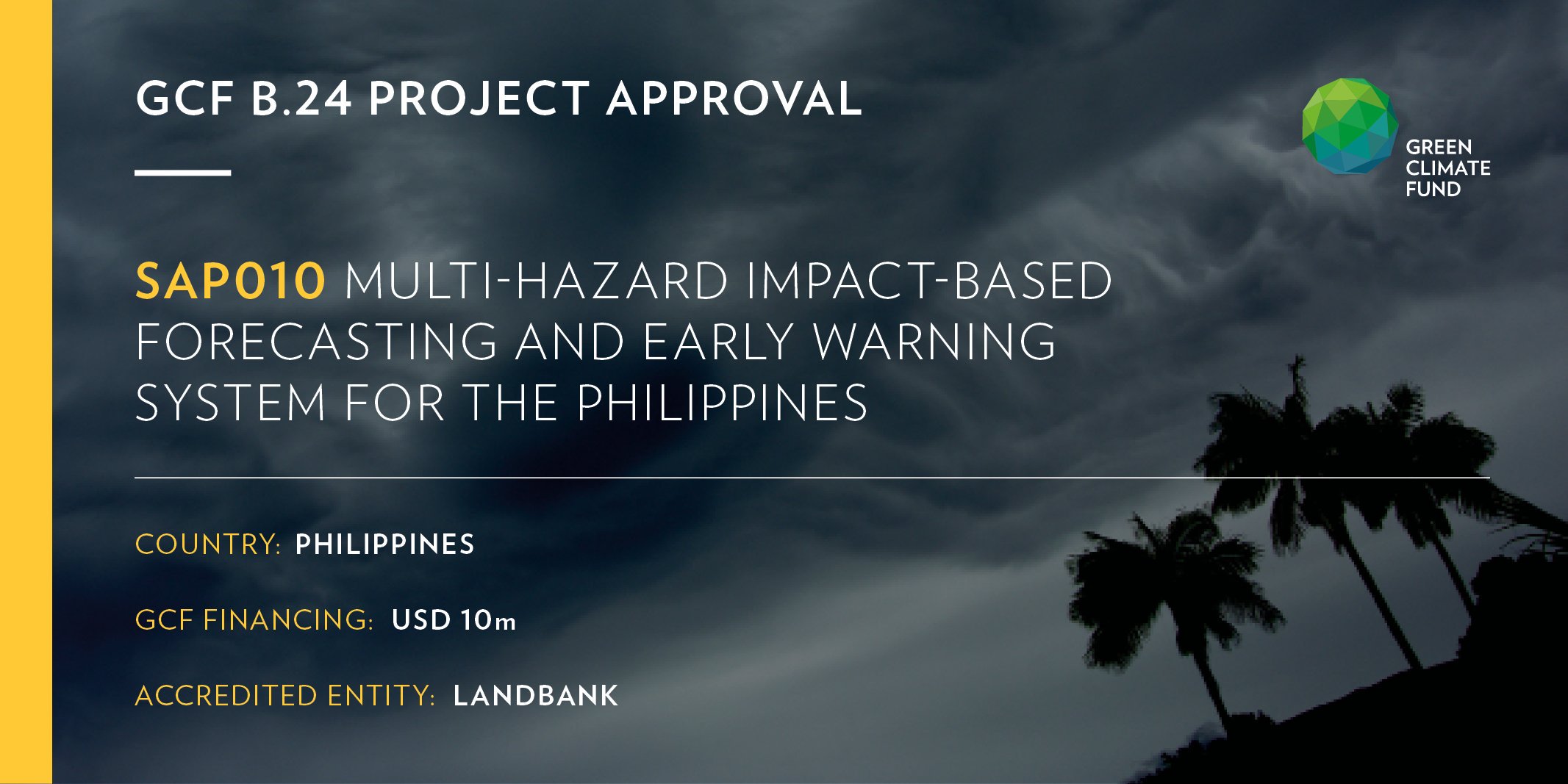
November 12, 2019 Tuesday

The Climate Change Commission (CCC) and Deputy Speaker and Antique Congresswoman Loren Legarda are very pleased to announce that the Green Climate Fund (GCF) Board, presently convened for its 24th Meeting held in Songdo, Korea this week, has just approved our country’s first GCF project on the establishment of a multi-hazard impact-based forecasting and early warning system (MH-IBF-EWS).
The GCF Board, which includes Deputy Speaker and Antique Congresswoman Loren Legarda as Alternate Member, approved the proposal for a USD10-million grant that aims to strengthen and ensure the delivery of actionable and timely early warning to communities and “last mile” end users at risk of impending natural hazards.
“The Board’s decision to approve this project comes at a critical time as we commemorate this November the onslaught of Typhoon Yolanda in the Philippines six years ago. The experiences and lessons we gained from Yolanda and other disasters necessitated the need for a project like this that can translate risk and hazard information into understandable and actionable early warnings, so our citizens remain safe and aware,” Legarda said.
The project aims to translate hazard forecasts into warnings that can convey location- and sector-specific impacts, providing tailored climate risk information directly to the LGUs and communities on the ground. It will implement four outputs:
i) Generate science-based multi-hazard weather and risk information;
ii) Establish an MH-IBF-EWS supported by a knowledge and decision support system;
iii) Improve national and local capacities in implementing a people-centered MH-IBF-EWS and forecast-based early actions (FbA); and
iv) Mainstream climate risk information and MH-IBF-EWS in development policy and planning, investment programming and resilience planning at national and local levels and institutionalizing a people-centered MH-IBF-EWS in the Philippines.
The GCF will channel the grant to Land Bank of the Philippines acting as the direct access entity of the project. The country’s national meteorological agency PAGASA will be the project’s lead executing entity, together with the Department of Interior and Local Government (DILG), Department of Environment and Natural Resources-Mines and Geosciences Bureau (DENR-MGB), Office of Civil Defense (OCD), World Food Programme (WFP), and the local governments of Tuguegarao City; Legazpi City; Palo, Leyte; and New Bataan, Davao de Oro, which shall also be the project’s target sites.
The DILG will be responsible for advocacy, outreach, and public awareness on MH-IBF-EWS, capacity building of local government units, and the updating of disaster preparedness and response protocols using impact-based early warning system. The DENR-MGB will be responsible for the generation of landslide hazard maps and establishing threshold values for landslide.
The OCD, as the implementing arm of the National Disaster Risk Reduction and Management Council (NDRRMC), will be expected to facilitate inter-agency coordination, mobilize resources for disaster preparedness and response, and manage information at the national and regional levels. The WFP will lead in activities related to FbA and shock-responsive social protection, including the development of index-based triggers and SOPs aligned with impact-based forecasting and warning system.
The target LGUs will be responsible for leading all activities in the project sites, such as building the exposure database with population and socio-economic variable; housing and building data and gathering data in the field; identifying forecast-based actions and financing mechanisms; adopting and implementing early action protocols (EAPs); identifying alternative resilient livelihood options; and integrating MH-IBF-EWS and FbA in their respective local resilience plans.
A Project Board consisting of the CCC, Land Bank, DOST-PAGASA, OCD, DENR-MGB, and DILG will be set up at the national level to provide project oversight and implementation strategies.
Climate Change Commissioner Rachel S. Herrera, who is also the National Focal Point to the GCF, said that accessing the GCF has been a priority of the CCC since day one, emphasizing that our strong advocacy for climate action and climate justice must be matched by an efficient system to access climate finance.
“We are overjoyed with the approval of our very first GCF country proposal, which is the product of convergence among agencies, organizations, and stakeholders who contributed to the development and submission of this project. This is just the beginning. The CCC, as the National Designated Authority to the GCF, will remain determined to access more climate finance that can enable genuine and lasting resilience for our vulnerable communities,” Herrera said.
“The Philippine Senate in the past years conducted workshops on climate finance and GCF processes when I chaired the Committee on Climate Change. This all bore fruit now. We will continue to build capacity in government agencies, LGUs, and private sector partners to build resilience for a whole of nation approach,” Legarda added.